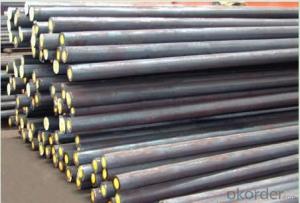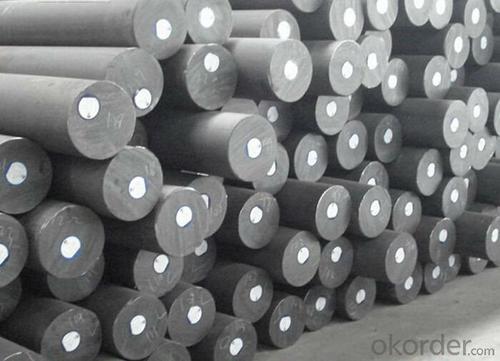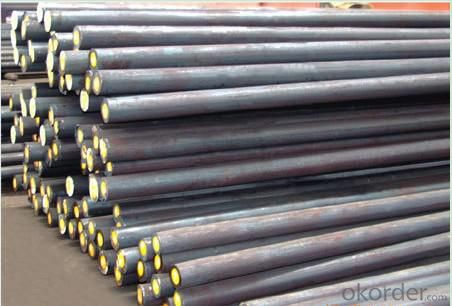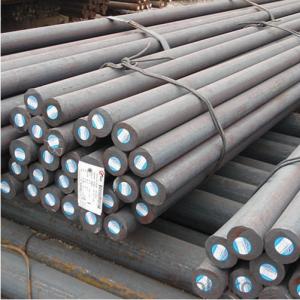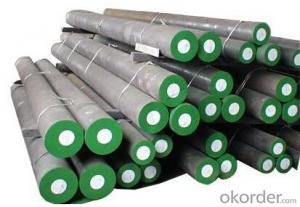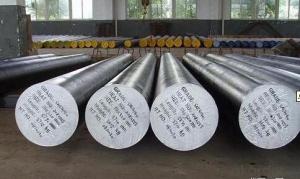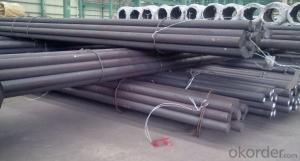Grade AISI4135 CNBM Alloy Steel Round Bar
- Loading Port:
- Shanghai
- Payment Terms:
- TT OR LC
- Min Order Qty:
- 25 m.t.
- Supply Capability:
- 10000 m.t./month
OKorder Service Pledge
OKorder Financial Service
You Might Also Like
Specification
Specification:
1. Produce Standard: GB, AISI, ASTM, SAE, EN, BS, DIN, JIS
2. Produce processes: Smelt Iron -EAF smelt Billet - ESR smelt Billet -Hot rolled or forged get the steel round bar and plate
3. Heat treatment: Normalized / Annealed / Quenched+Tempered
Chemical Composition:
Grade | Dia.(mm) | C | Si | Mn | Cr | P | S | Ni | Cu | Mo |
4135 | 13-230 | 0.32-0.40 | 0.17-0.37 | 0.40-0.70 | 0.80-1.10 | ≤0.035 | ≤0.035 | ≤0.03 | ≤0.03 | 0.15-0.25 |
Usage and Applications:
Mainly used in automobile manufacturing for the part of crankshaft, linkage,steering knuckle, wheel hub, door butt and semi-axle shaft sleeve..etd.
Packaging & Delivery:
Packaging Detail: Standard seaworthy packing or as customer required; all goods are packed in bundle with steel strips and shipped by break bulk vessel or container
Delivery Detail: 45 days
Production Flow:
hot forging/hot rolling + annealing/normalizing + tempering/quenching + tempering/any conditions based on the customer's requirement
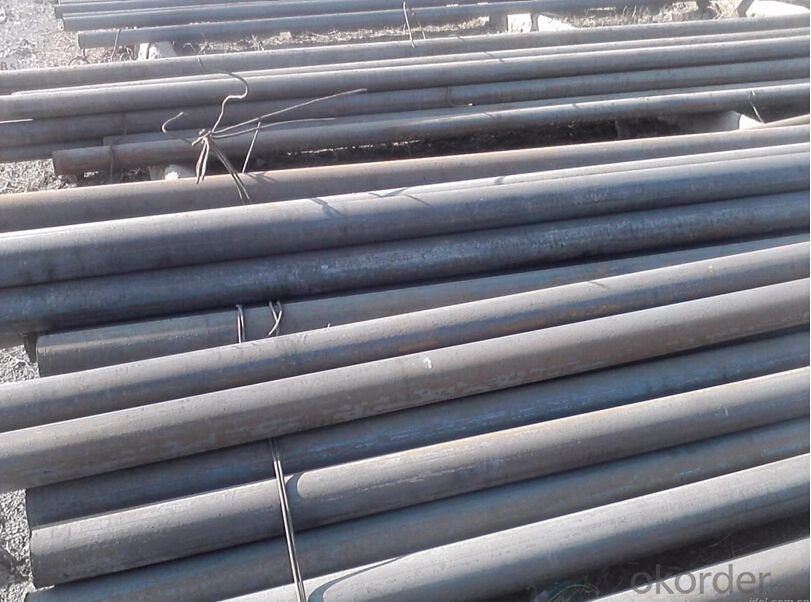
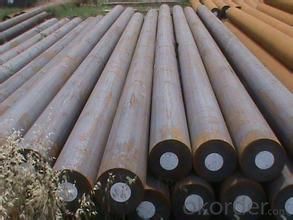
Quality Assurance:
1. We will strictly inspect our production that we sold according to the customer’s request.
2. Our steel reaches international quality standards.
3. Quality should be in conformity with the specification of the manufacturer. Quantity and packing conditions should be in conformity with the term in the contract.
4. Should the packing found damaged, the buyer has the right to claim to the seller
- Q: What are the different forging techniques used for special steel?
- Some of the different forging techniques used for special steel include open die forging, closed die forging, and ring rolling. Open die forging involves shaping the steel by hammering it between flat dies or anvils. Closed die forging, also known as impression die forging, utilizes dies that contain specific shapes to mold the steel into the desired form. Ring rolling is a technique used to produce seamless rings by shaping the steel through a combination of axial compression and radial expansion. These forging techniques allow for the production of high-quality and complex special steel components with desired properties and shapes.
- Q: What are the different methods of preventing pitting corrosion in special steel?
- There are several methods available to prevent pitting corrosion in special steel. These techniques aim to protect the steel surface from the corrosive environment and inhibit the formation of pits. Some of the commonly used methods include: 1. Passivation: Passivation involves treating the steel surface with a chemical solution or coating to create a protective oxide layer. This layer acts as a barrier, preventing the penetration of corrosive agents and reducing the risk of pitting corrosion. 2. Alloying: By adding specific alloying elements to the steel composition, its resistance to corrosion can be improved. Elements such as chromium, nickel, and molybdenum are often used as they enhance the steel's ability to form a stable passive film and resist pitting corrosion. 3. Cathodic protection: This method involves using a sacrificial anode or applying an impressed current to the steel surface. By making the steel cathodic, it becomes less susceptible to corrosion as electrons are drawn away from it, preventing the formation of pits. 4. Coatings: Applying a protective coating to the steel surface can effectively prevent pitting corrosion. Coatings such as paint, epoxy, or polymer-based materials act as a physical barrier, shielding the steel from corrosive agents. 5. Environmental control: Controlling the environment surrounding the steel can also help prevent pitting corrosion. This includes measures such as regulating temperature, humidity, and pH levels to ensure they are within acceptable limits and inhibiting the corrosion process. 6. Regular maintenance: Regular inspection and maintenance of the steel surface are crucial for preventing pitting corrosion. Any signs of damage or deterioration should be addressed promptly to prevent further corrosion and potential pitting. It is important to note that the choice of prevention method depends on various factors such as the specific steel composition, the corrosive environment, and the intended application. Proper selection and implementation of these methods can significantly enhance the resistance of special steel to pitting corrosion, ensuring its longevity and performance.
- Q: What are the common applications of special steel in the manufacturing industry?
- Special steel, known as alloy steel as well, has unique properties and superior performance, making it widely used in the manufacturing industry for various applications. Different sectors benefit from special steel in the following ways: 1. Automotive Industry: Components like engine parts, gears, axles, and crankshafts heavily rely on special steel due to its high strength, durability, and resistance to wear and corrosion. Its exceptional performance in critical automotive applications makes it the preferred choice. 2. Aerospace Industry: In the aerospace sector, special steel is vital for manufacturing aircraft components such as landing gear, turbine blades, and structural parts. Its high tensile strength, lightweight nature, and ability to withstand extreme temperatures ensure the safety and efficiency of aircraft operations. 3. Construction Industry: The construction sector extensively uses special steel for manufacturing structural elements like beams, columns, and reinforcement bars. Its superior strength, ductility, and resistance to external forces guarantee the structural integrity and safety of buildings, bridges, and other infrastructure projects. 4. Oil and Gas Industry: The oil and gas industry relies heavily on special steel for manufacturing pipelines, drill bits, valves, and other equipment. Its high resistance to corrosion, pressure, and extreme temperatures make it suitable for handling the harsh operating conditions encountered in oil and gas exploration, extraction, and transportation. 5. Tool and Die Making: Special steel is commonly employed in tool and die making due to its excellent hardness, toughness, and wear resistance. Various industries, including automotive, aerospace, and consumer goods manufacturing, utilize special steel for manufacturing cutting tools, molds, dies, and punches. 6. Medical Industry: The medical industry utilizes special steel for manufacturing surgical instruments, implants, and medical devices. Its biocompatibility, corrosion resistance, and sterilizability ensure the safety and effectiveness of medical tools and implants. These examples represent only a fraction of the applications of special steel in the manufacturing industry. Its versatility, reliability, and performance contribute to the advancement and growth of various manufacturing processes in numerous sectors.
- Q: How does spring steel maintain its elasticity?
- Spring steel maintains its elasticity due to its unique composition and manufacturing process. It is made from a specific type of high-carbon steel that undergoes a specialized heat treatment called quenching and tempering. This process involves heating the steel to a high temperature and then rapidly cooling it in water or oil, followed by reheating to a specific temperature and allowing it to cool slowly. This heat treatment creates a fine-grained microstructure in the steel, which gives it the ability to withstand repeated bending or twisting without permanently deforming. Additionally, the high carbon content in spring steel enhances its strength and resilience, allowing it to return to its original shape even after being subjected to significant force or pressure.
- Q: What are the different methods of preventing hydrogen-induced cracking in special steel?
- There are several methods to prevent hydrogen-induced cracking in special steel. One common approach is to use preheating techniques, which involve heating the steel before welding to reduce hydrogen levels and minimize the risk of cracking. Another method is to employ low-hydrogen welding consumables, such as low-hydrogen electrodes or filler wires, which have reduced hydrogen content and can help prevent cracking. Additionally, post-weld heat treatments, such as stress relieving or tempering, can be implemented to remove residual hydrogen and relieve stress in the steel, reducing the chances of cracking. Proper cleaning and preparation of the steel surface, as well as controlling the welding parameters, are also crucial in preventing hydrogen-induced cracking.
- Q: What are the different heat treatment processes used in special steel production?
- Some of the different heat treatment processes used in special steel production include annealing, quenching, tempering, and normalizing. Annealing is a process of heating and slowly cooling the steel to relieve internal stresses and enhance its ductility. Quenching involves rapidly cooling the steel to increase its hardness and strength. Tempering is done after quenching to reduce brittleness and improve toughness. Normalizing is a heat treatment process that involves heating the steel to a specific temperature and then cooling it in still air to achieve a uniform structure. These processes are essential for achieving the desired mechanical properties and performance of special steel.
- Q: How does special steel perform in electrical applications?
- Special steel, also known as electrical steel, is specifically designed and manufactured to meet the unique requirements of electrical applications. It exhibits excellent magnetic properties, making it highly suitable for use in electrical machines and devices. One of the key characteristics of special steel is its low electrical resistivity, which allows for efficient current flow and minimizes energy losses in electrical circuits. This low resistivity is achieved by carefully controlling the composition and microstructure of the steel. Additionally, special steel possesses a high magnetic permeability, which means it can easily be magnetized and demagnetized. This property is essential for the efficient operation of electrical machines, such as transformers, motors, and generators. Furthermore, special steel has a low coercivity, which means it requires relatively low levels of magnetic field strength to magnetize or demagnetize it. This property is beneficial in applications where rapid and precise magnetic switching is required, such as in electric transformers. Special steel also exhibits low hysteresis loss, which refers to the energy dissipated as heat during magnetization and demagnetization cycles. This characteristic ensures minimal energy losses in electrical devices, leading to improved overall efficiency. In summary, special steel performs exceptionally well in electrical applications due to its low electrical resistivity, high magnetic permeability, low coercivity, and low hysteresis loss. These properties make it an ideal choice for a wide range of electrical machines and devices, contributing to their efficiency and reliability.
- Q: How does special steel contribute to the overall strength and durability of structures?
- Special steel contributes to the overall strength and durability of structures by providing enhanced mechanical properties such as higher tensile strength, improved corrosion resistance, and increased toughness. Its unique composition and manufacturing processes allow for greater load-bearing capacity, better resistance to wear and tear, and increased longevity. This makes it a crucial material in construction, engineering, and other industries where strength and durability are paramount.
- Q: What are the main characteristics of high-speed steel forgings?
- High-speed steel forgings possess several key characteristics that make them highly desirable in various industries. Firstly, high-speed steel forgings exhibit exceptional hardness and wear resistance. This is due to their composition, which typically includes elements such as tungsten, molybdenum, chromium, and vanadium. These elements form hard carbides within the steel matrix, resulting in a material that can withstand high temperatures and resist abrasion and deformation. Secondly, high-speed steel forgings have excellent heat resistance. This allows them to maintain their hardness and strength even at elevated temperatures, which is crucial in applications where tools or components are subjected to intense heat during operation. Another important characteristic of high-speed steel forgings is their ability to retain their cutting edge for extended periods. This is particularly advantageous in cutting tools, where a sharp edge is crucial for efficient and accurate machining. The high hardness of the steel ensures that the cutting edge remains sharp, resulting in improved tool life and performance. Furthermore, high-speed steel forgings have good toughness and impact resistance. This makes them less susceptible to cracking or chipping under heavy loads or sudden impacts, ensuring their durability and reliability in demanding applications. In addition to these mechanical properties, high-speed steel forgings also have excellent machinability. They can be easily shaped, formed, and machined into complex geometries, making them ideal for producing intricate components or tools. Overall, the main characteristics of high-speed steel forgings include exceptional hardness, wear resistance, heat resistance, cutting edge retention, toughness, impact resistance, and machinability. These qualities make them highly sought-after in industries such as aerospace, automotive, tooling, and machining, where performance, reliability, and longevity are crucial.
- Q: How does special steel perform in high-frequency applications?
- Special steel performs well in high-frequency applications due to its excellent conductivity and high magnetic permeability. These properties allow it to efficiently transmit and handle high-frequency currents and electromagnetic fields, minimizing energy losses and ensuring efficient performance in applications such as transformers, electrical motors, and high-frequency electromagnetic shielding.
Send your message to us
Grade AISI4135 CNBM Alloy Steel Round Bar
- Loading Port:
- Shanghai
- Payment Terms:
- TT OR LC
- Min Order Qty:
- 25 m.t.
- Supply Capability:
- 10000 m.t./month
OKorder Service Pledge
OKorder Financial Service
Similar products
Hot products
Hot Searches
Related keywords

